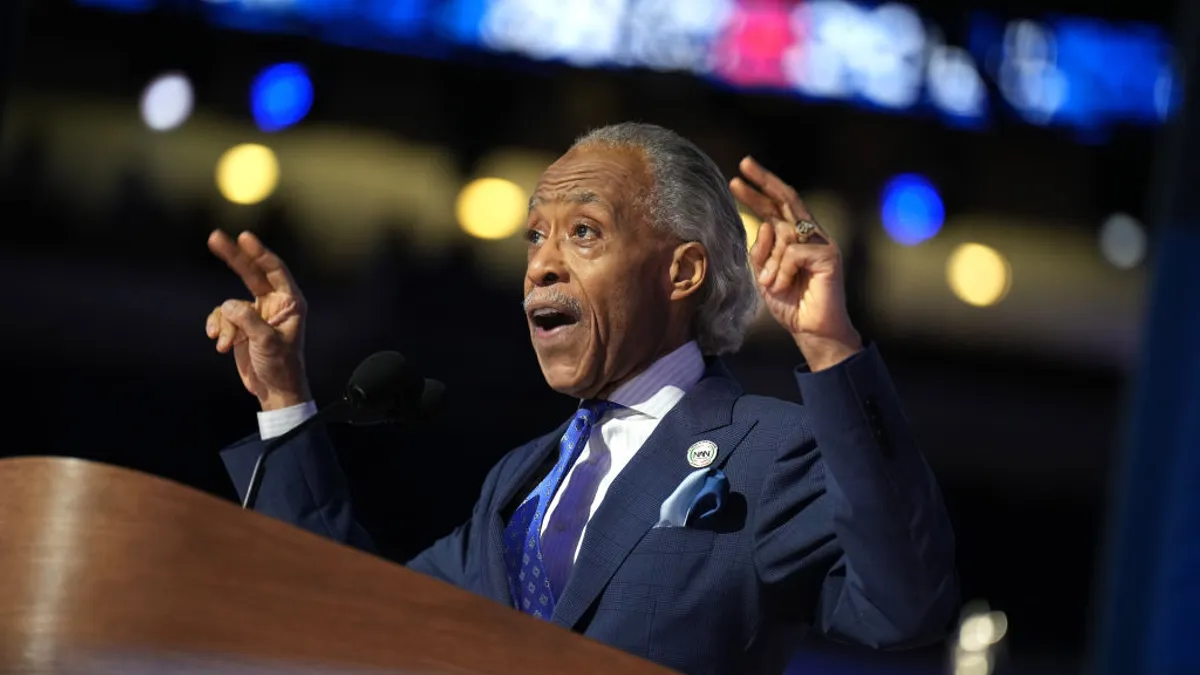Dive Brief:
-
Civil rights activist Rev. Al Sharpton and Target CEO Brian Cornell will meet this week, at the request of the retailer, his group, National Action Network, confirmed by email. In social media posts Sharpton said he is considering a boycott.
-
Meanwhile, a 40-day “fast from spending any money at Target” launched in early March by an Atlanta pastor, Rev. Jamal Bryant, will culminate in an event Friday to Sunday in Atlanta featuring Black-owned vendors and a town hall next week when Bryant will discuss next steps.
-
Store traffic to Target has fallen since the company announced the end of some diversity efforts, according to data from footfall analytics firm Placer.ai. Target didn’t immediately return Retail Dive’s requests for comment.
Dive Insight:
A slew of retailers and brands, facing boycotts and lawsuits, have rolled back their diversity, equity and inclusion programs, though few aside from Tractor Supply have abandoned them entirely. Others, most notably Costco, have vociferously defended their DEI efforts.
Still others, like Target, have attempted to find a middle stance, announcing a retreat while also stating support for diversity in a more general or limited way. Target Chief Community Impact and Equity Officer Kiera Fernandez in January cited “the importance of staying in step with the evolving external landscape, now and in the future” in her outline of the changes.
The retailer once prided itself on its progressive values, as when it touted its investment in Black-owned brands. Its exuberant Pride collection in 2023 invited a backlash from all sides as the company, facing vitriol online and in stores, took down its displays.
Today, its tepid statements on issues, including DEI, is not likely sitting well with many of its most loyal customers, according to Alison Taylor, professor at New York University’s Stern School of Business and author of “Higher Ground: How Business Can Do the Right Thing in a Turbulent World.”
“Target is not the only company to do this,” Taylor said by email. “Why are we more angry than at Walmart? I think because the reversal is bigger.”
Walmart last year also scaled back several of its diversity initiatives.
Unlike Walmart, though, Target has been struggling. Sales slid in its most recent quarter, which was marked by out-of-stocks, and its full-year outlook was muted. Its recent unveiling of a multiyear merchandise overhaul got a lukewarm response from analysts.
Traffic to Target stores dropped 9% in February (which had one fewer day than last year) and 6.5% in March, after rising 3.6% in January, per Placer.ai data. That compares to, at Costco, a 7.9% rise in January, 2.2% rise in February and 7.5% rise in March; and, at Walmart, a 3% rise in January, 5.7% drop in February and 3.8% drop in March.
There could be multiple reasons for Target’s declines, according to Placer.ai, including “calendar shifts, post-holiday spending pullbacks, decreased consumer confidence, economic and tariff uncertainty, and unseasonably cold weather.” But Wells Fargo analysts led by Edward Kelly in March said they suggest the retailer “seems to have had some DEI backlash.”
That Target was compelled to reach out to Sharpton hints at the limitations of that middle ground it's trying to reach, Taylor said. The meeting plans were first reported by CNBC.
“My gut is that they’ve realized they misstepped and are trying to figure out a positive path,” she said. “I think it’s a good example of how the headline commitment matters just as much as the below-the-line substance, especially if you’ve historically made this a big part of your brand. So keeping the substance won’t necessarily make up for a loss of trust. It’s a sad story, as I think Target is well intentioned and caught between a rock and a hard place.”
Sharpton and the National Action Network are mulling boycotts and other collective actions against companies that have scaled back their DEI commitments. To that end, at the group’s behest, Sharpton and other group officials met with PepsiCo executives Tuesday “to discuss our grievances over reports they were rolling back nearly $500 million in DEI commitments.”
















